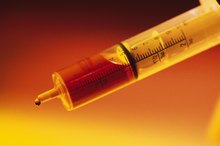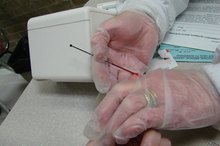What does fact checked mean?
At Healthfully, we strive to deliver objective content that is accurate and up-to-date. Our team periodically reviews articles in order to ensure content quality. The sources cited below consist of evidence from peer-reviewed journals, prominent medical organizations, academic associations, and government data.
- MayoClinic.com; Liver Function Tests; July 2010
- Mayo Clinic.com: Elevated Liver Enzymes; May 5, 2011
- “Biological And Pharmaceutical Bulletin”; Lithium Induced Toxicity in Rats: Blood Serum Chemistry, Antioxidative Enzymes in Red Blood Cells and Histopathological Studies; M. Ahmad, et al.; 2011
- “Biological And Pharmaceutical Bulletin”; Lithium Induced Toxicity in Rats: Blood Serum Chemistry, Antioxidative Enzymes in Red Blood Cells and Histopathological Studies; M. Ahmad, et al.; 2011
The information contained on this site is for informational purposes only, and should not be used as a substitute for the advice of a professional health care provider. Please check with the appropriate physician regarding health questions and concerns. Although we strive to deliver accurate and up-to-date information, no guarantee to that effect is made.
Does Lithium Carbonate Affect Liver Enzymes?
Lithium carbonate, more commonly just called lithium, is a medication used to treat bipolar disorder 2. The older term for bipolar disorder is manic-depressive illness. Lithium decreases both the frequency and the intensity of the manic phase of the disease, which is characterized by rapid speech, a reduced need for sleep, hyperactivity, poor judgment and elation. Most medications have side effects, and lithium is no exception.
If you are experiencing serious medical symptoms, seek emergency treatment immediately.
The Liver
The liver is the organ responsible for regulating most chemical levels in the blood. It also produces and excretes bile, which is used to break down fats. Among the more than 500 functions the liver performs: production of cholesterol; regulation of amino acids; hemoglobin processing; breakdown of nutrients and drugs; and regulation of blood clotting. When your doctor wants to know if your liver is working the way it should, you may be asked to have liver function tests 1.
- The liver is the organ responsible for regulating most chemical levels in the blood.
Liver Function Tests
Lisinopril & Elevated Liver Enzymes
Learn More
Liver function tests are a measure of certain enzymes or proteins in your blood 1. Tests such as albumin and bilirubin are actually an indicator of how well the liver is working, while other tests called liver enzyme tests show levels of enzymes the liver releases when it is responding to damage or disease. Common liver enzyme tests include the alanine transaminase or ALT, the aspartate transaminase or AST, and the alkaline phosphatase or ALP. Two other tests that may be done are the Gamma-glutamyltransferase or GGT, and the L-lactate dehydrogenase (LDH). An increase in any of these enzyme tests may indicate you have liver damage or disease.
Lithium, the Liver and Kidneys
There is no report of liver toxicity or changes in liver enzymes according to Drugs.com. There is one recent report in the 2011 "Biological and Pharmaceutical Bulletin" that rats given lithium developed changes in the liver enzymes ALT, AST and ASP 4. Problems with kidneys and renal function, however, are relatively common side effects from lithium, and a patient on lithium should have his or her renal function assessed on a regular basis.
Considerations and Warnings
Elevated Alkaline and Phosphatase During Pregnancy
Learn More
Although lithium can cause a wide variety of side effects, particularly when lithium levels are too high, most of the side effects are renal, gastrointestinal or involve the cardiovascular system rather than the liver. Neurological symptoms can also occur. The most serious side effect of lithium is that of birth defects. If you have questions about lithium carbonate and liver enzymes, consult a health care professional 2.
- Although lithium can cause a wide variety of side effects, particularly when lithium levels are too high, most of the side effects are renal, gastrointestinal or involve the cardiovascular system rather than the liver.
Related Articles
References
- MayoClinic.com; Liver Function Tests; July 2010
- Drugs.com: Lithium Carbonate
- Mayo Clinic.com: Elevated Liver Enzymes; May 5, 2011
- “Biological And Pharmaceutical Bulletin”; Lithium Induced Toxicity in Rats: Blood Serum Chemistry, Antioxidative Enzymes in Red Blood Cells and Histopathological Studies; M. Ahmad, et al.; 2011
- Hedya SA, Swoboda HD. Toxicity Lithium. Updated April 14, 2019.
- Altschul E, Grossman C, Doughtery R, et al. Lithium Toxicity: A Review of Pathophysiology, Treatment, and Prognosis. Practical Neurology. March 2016:42–45.
- Lithium Toxicity. U.S. National Library of Medicine. Updated December 2, 2019.
Writer Bio
Beth Greenwood is an RN and has been a writer since 2010. She specializes in medical and health topics, as well as career articles about health care professions. Greenwood holds an Associate of Science in nursing from Shasta College.









